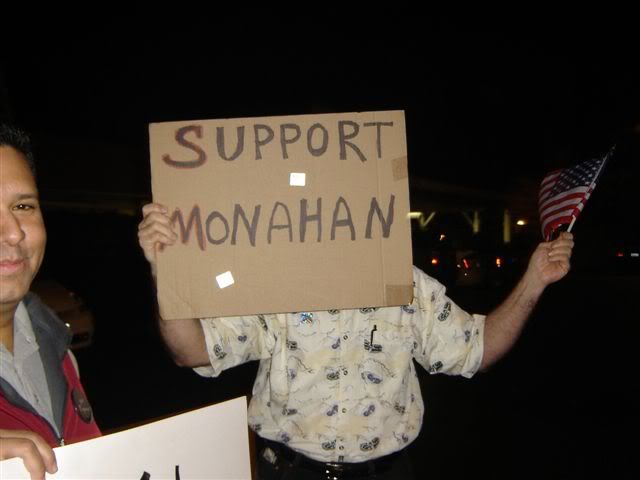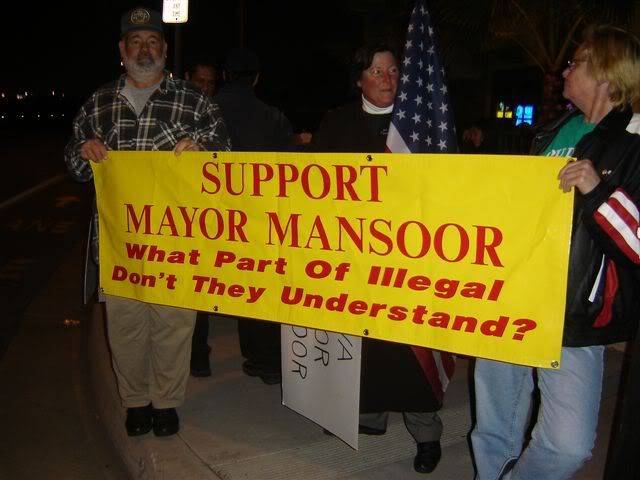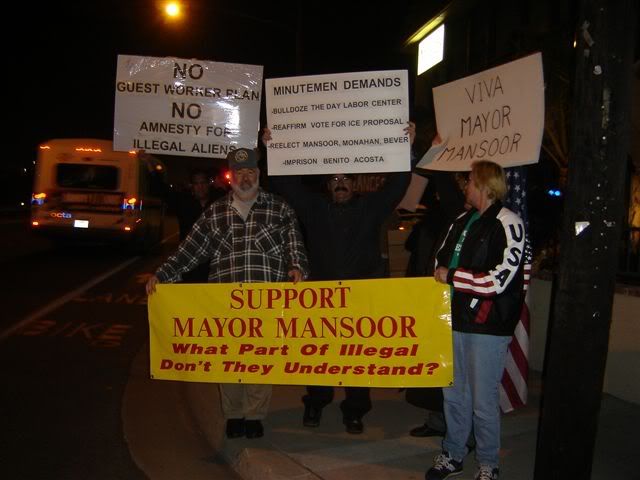Results 1 to 2 of 2
Thread Information
Users Browsing this Thread
There are currently 1 users browsing this thread. (0 members and 1 guests)
-
03-19-2006, 08:05 PM #1
Conversation with Costa Mesa mayor isn't all talk
http://www.dailypilot.com/front/story/4 ... 1189c.html
Modified March 17, 2006
ON THE TOWN
Conversation with Costa Mesa mayor isn't all talk
STEVE SMITH
Sometimes, all it takes to straighten things out is a conversation. Not an e-mail, not a letter, not even a telephone call -- although that's good -- but a face-to-face conversation.
It's simple, really. You just sit down and talk and watch the amazing results.
Last Monday, Costa Mesa Mayor Alan Mansoor was kind enough to sit down with me to discuss a wide range of topics.
I asked Mansoor for the interview after reading his March 5 profile in the Los Angeles Times. In the story, the reporter writes that Mansoor "appreciated [the help of a particularly vocal Costa Mesa resident] when he ran for council. But Mansoor says he thinks for himself."
advertisement
*
I asked Mansoor if that statement by The Times reporter was accurate.
"No," Mansoor said. "I never said that. He is a member of the community just like everyone else, but I am disturbed at a lot of what he says and writes. It's way out there. He expressed his support, and I have no control over that."
We moved on.
The next question was easy.
"Do you want to run all the Latinos out of Costa Mesa? Because that's what some people believe."
"No, I don't. People make up outlandish statements because they have no intelligent argument to make. They don't want to sit down and discuss the facts of the issues rationally. I have the utmost respect for anyone who comes here legally to work."
The Job Center was next. I prefaced my remarks by reminding Mansoor of something that at least one of his colleagues and a few readers seem to have missed. When it comes to the Job Center, mine is an informed opinion. I lived on the Westside of Costa Mesa for 17 years, passed the Job Center several times a week and even used it several times for my business. I lived on the Westside before the Job Center was established and long after it opened.
Since it closed at the end of the last year, I have visited the stretch of Placentia Avenue, no fewer than one morning per week. I told Mansoor that closing the Job Center was a mistake as it scattered day laborers about Placentia Avenue once again.
"I disagree," said Mansoor. "The sky has not fallen and the area [around the old Job Center site] is no worse than it was before. In fact, a lot of areas are better. There is no more loitering in that area, and there is less in some areas. People who live there have told me it is better now."
I felt as though we were talking about different job centers. My memory of the Job Center is clear and it accomplished its goal: It took day laborers off the streets and put them in an organized, central location. I believe that had the Job Center not done that, it would have been closed to resident complaints years ago instead of staying open for more than a decade.
At that point, the tug-of-war was over. He wasn't going to convince me and I wasn't going to convince him. So we moved on.
I asked about the American Civil Liberties Union lawsuit against the city; the suit says the city denied some civil rights to a speaker at a recent City Council meeting.
"I can't comment on that," Mansoor said.
Well, maybe he can't but I can.
I told Mansoor that not only did I think he did the right thing by ousting the speaker, I think he waited too long to do it. What I did not tell Mansoor only because it did not occur to me until later, was that the ACLU involvement, in my opinion, happened only because of the lightning rod the city extended when it voted to use the police force to help enforce immigration laws.
Had this just been another community of about 104,000 people with no such plan in place, it would have been just a lively City Council meeting and the ACLU would not be suing the city today. But now, thanks to the police involvement in this sensitive issue, we're on their radar.
It was the radar issue we tackled next. I did not believe before we sat down and I do not believe now that Mansoor is a racist, as some would like us to believe.
I believed then, as I do now, that Mansoor is wired to uphold the law in its strictest terms. This belief was supported by his opening comment.
"As elected officials," he said, "we should not have excuses to not enforce the law. We should find reasons to uphold our oath of office.
"I support those who want to come here legally. My parents came here from Egypt and Sweden. Assimilation has to be a part of that process."
On this issue, Mansoor is unlikely to budge.
"Why would we change a decision to uphold the law?" he asked.
I only wish it were as brown and white.
I will say that Mansoor is right about his description of his opposition's tactics.
"They're engaging in a lot of silly name-calling," he said. "My position has been deliberately misstated by those who oppose it."
At this point, I asked: "If you could turn back the clock, what would you do differently?"
Mansoor thought for a moment and could not come up with anything.
He then challenged the opposition.
"Why not bring a viable option to the table?" he asked. "Why not tell us what laws they are willing to support the enforcement of?"
There is no argument here about upholding the law. But I reminded Mansoor of the story I told in this space a few weeks ago of the Immigration and Naturalization Service raids on the factory in which my father worked as well as others in the Gardena area of Los Angeles community.
The raids were regular and no one thought to engage the services of the ACLU or to complain to anyone about them.
Now, however, times have changed, and I guess part of me was hoping he was going to say that some improved community communication prior to the police enforcement vote would have been a change he'd like to have made.
We moved on again.
"What about that silly new bridge in Fairview Park?" I asked.
That would be the ugly one that spans Placentia Avenue connecting both sides of the park; the bridge that is 50 yards or so from a perfectly good traffic signal.
"It was part of a package of improvements of Fairview Park," Mansoor said. "But it's not needed, and it's not aesthetically pleasing. I voted no on the final expenditure."
Now we were making progress. Here was one issue on which we were in lock step. The bridge, however, is in place and it's too late to do anything except let City Hall know what a waste it was and that voters remember these things at the polls.
Next up was Costa Mesa's Westside, including Triangle Square, the mystery mall.
If you've never been to Costa Mesa's Westside, or if you haven't spent much time there, here is a description in a nutshell: It is a mix of white and Latino cultures, of apartments and homes and of small businesses occupying some prime bluff property where homes should have been zoned many years ago (my business was there for a time in the 1990s).
"Look at how things are improving," Mansoor said. "The utilities on 19th Street are underground, the streets are paved, and the street has been re-landscaped."
No argument here, either -- 19th Street looks a lot better.
As to the future of the Westside's revitalization, Mansoor said: "I believe the free market is a good tool for revitalization."
The last comment came in the context of our discussion of Triangle Square.
"It's up to private ownership to make it work, but we're willing to work with them and offer whatever assistance we can."
Mansoor and I wondered how so many businesses could come and go from Triangle Square but the Yardhouse restaurant remains and does well.
Part of it, we agreed, is that it happens to be a very good restaurant.
Yes, 19th Street looks better, but I will continue to wonder about the benefits of these cosmetic changes when the city's soul is exposed to the nation and the city itself is divided.
Mansoor does not believe the city is divided.
Mansoor's most pointed comments were saved for the Newport-Mesa Unified School District board and some of the parents in the local schools.
"I don't know why parents aren't demanding more from the school district," Mansoor said. "And I don't understand the delay in opening a charter school. The board needs to tell us what they are going to proactively do to improve schools."
Mansoor suggested, as I did here earlier this year, that instead of the board watching a parade of charter school proposals, that they tell us what they're looking for.
"There should be more pressure from the public to get the school district involved in improving Costa Mesa."
We also spoke about the attempted annexation of Santa Ana Heights and the new developing annexation issue over at Banning Ranch.
There wasn't much to say about the former, and the latter is just now shaping up. That's an issue to watch.
We wrapped up our meeting by discussing the proposal to move the city's utility lines underground. Mansoor would like to do this through a utility tax over the 20 to 30 years it would take to complete the job. According to Mansoor, the tax would only be "a few dollars per month per family."
As part of the process of determining whether to move forward, the city may conduct polls to see how residents feel about paying for the improvement.
I made a mental note to thank Mansoor for not calling the new tax a "bond" or some other euphemism for a tax, the way the school board does.
And I wondered about the irony of polling about utility poles -- a good idea -- but not polling residents last year about getting the police force involved in enforcing immigration laws or about closing the Job Center.
The city council cannot and should not take a poll prior to every major decision. We elected these people to make these decision for us, and we expect that as part of their due diligence they will encourage input from the community.
But for something as contentious as the immigration issue, more communication was in order last year.
That's the one thing I was hoping Mansoor would answer when I asked him what he'd do differently. I was hoping he'd say that he would have spent more time with the Latino community to get them to understand what he was trying to do.
Allan Mansoor is dedicated to improving the city of Costa Mesa. On that there is no argument. What he sees as improvements and what I and others may see as improvements are sometimes different.
And that's OK.
What's not OK is allowing these issues to boil over. When that happens it is almost always a result of a failure to communicate or a failure to communicate properly.
I thought for a moment before letting him go, then asked: "What about higher office?"
"I have my hands full in Costa Mesa. There is so much going on here."
That was communicated very well.
* STEVE SMITH is a Costa Mesa resident and a freelance writer. Readers may leave a message for him on the Daily Pilot hotline at (714) 966-4664 or send story ideas to dailypilot@latimes.com.




http://www.dailypilot.com/front/story/4 ... 1189c.html
-
03-19-2006, 08:07 PM #2
More


 LinkBack URL
LinkBack URL About LinkBacks
About LinkBacks




 Reply With Quote
Reply With Quote

500,000 Illegals Caught on Arizona Ranch
05-02-2024, 09:08 AM in illegal immigration News Stories & Reports